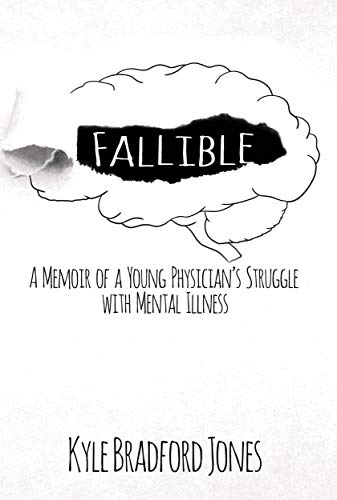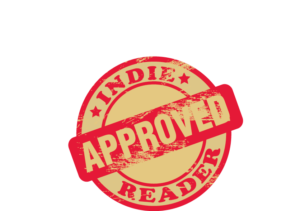Fallible received a 4+ star review, making it an IndieReader Approved title.
Following find an interview with author Kyle Bradford Jones.
What is the name of the book and when was it published?
Fallible: a memoir of a young physician’s struggle with mental illness. Released 2 April 2020 by Black Rose Writing
What’s the book’s first line?
“There are so many ways to describe hospitals that it’s hard to decide which sense I should evoke.”
What’s the book about? Give us the “pitch”.
This is my experience as someone with a major depressive disorder and generalized anxiety disorder who is also a physician. My illness was worsened through my training as a physician, but my experiences aren’t all that different from others who suffer with these afflictions. If you’re not one of the twenty percent to experience mental illness this year, you know one of them. Perhaps it’s a close friend, a spouse, a family member. And so few of us understand how to help. Hopefully Fallible offers some direction.
What inspired you to write the book? A particular person? An event?
I have written and spoken about my experiences with mental illness in multiple places, so I was publicly open with my struggles. The idea to put it in book form came following a podcast episode for “About Progress” that my wife and I did wherein we talked about my story and its impact on my family. The host suggested writing a book on the topic while chatting after recording. I’ve always loved writing and proposed book ideas to different agents and publishers but never got anywhere. This seemed like a story that needed to be shared to help decrease the stigma of those with a mental illness, both for those inside and outside of health care.
What’s the main reason someone should really read this book?
No one is immune to the effects of mental illness, whether it’s in yourself or a close friend or loved one. I include my perspective as a personal sufferer of mental illness, as a physician that understands the diagnosis and treatment aspects, and how it has impacted other areas of my life. I talk about how my close relationships have been affected, the impact on my religious beliefs, and the function of my day-to-day life as someone who struggles with such an affliction. It really does apply to everyone.
If they made your book into a movie, who would you like to see play the main character(s)?
Well I’m obviously a dead ringer for Jon Hamm [laughs mischievously], so he should definitely sign on for the project. Honestly, I’ve been told my many people that I have a resemblance to Zachary Quinto. He’s definitely very talented so I would have no problem with him playing me in the movie.
When did you first decide to become an author?
I’ve been writing since I was a teenager, though I typically write more non-fiction essays. I’ve wanted to write books ever since then, almost in the role of a medical journalist, but my journey took me to other places. I’m glad I’ve stuck with it, even if it did take 20 years to come to fruition.
Is this the first book you’ve written?
Yes, but hopefully not the last!
What do you do for work when you’re not writing?
I am (obviously) a practicing physician. I work at the University of Utah School of Medicine where I teach students, residents, and perform research. About half of my time is spent seeing patients. My practice is exclusively comprised of individuals with a developmental disability, which provides wonderful challenges and rewards.
What’s the best and the hardest part of being an indie?
Most people think that indie basically means “small,” but I think of it more as creative freedom. The flexibility and creative license is great. The hardest part of being indie is that it is more difficult to pull off non-fiction projects, which will create a challenge for me going forward.
What’s a great piece of advice that you can share with fellow indie authors?
Be proud of what you accomplish. Going indie doesn’t mean settling for less, but often actually means the opposite.
Would you go traditional if a publisher came calling? If so, why?
I would consider going traditional if the opportunity arose, but only because sometimes more up front support is needed for certain non-fiction books. That being said, I would prefer to stay indie if the opportunity is there.
Is there something in particular that motivates you (fame? fortune?)
Fortune is nice, but I’m really motivated by how many people could be touched and helped by my work. I want to fill a societal need, in particular with Fallible to decrease the stigma of mental illness. I feel strongly that this is a book that so many of us need, and I want to support that need.
Which writer, living or dead, do you most admire?
Thomas Merton has long been my favorite writer. He beautifully blends religion, morality, ethics, social justice, and the ultimate longings of the heart together in such an eloquent way. As a monk, he sacrificed much of his pride and human desires to accomplish what he thought was best, and we so much the better for it.
Which book do you wish you could have written?
I recognize the irony in saying that I wish I had written someone else’s memoir, but The Seven Storey Mountain by Thomas Merton is one of my favorites. It’s such a great story, with so much beauty in his personal journey. Maybe it’s better to say that I wish I could write more like him. I also wish I could written Jack Kerouac’s On the Road, with its frenetic simplicity and passion. That has been a big inspiration to me since I first read it as a teenager.


